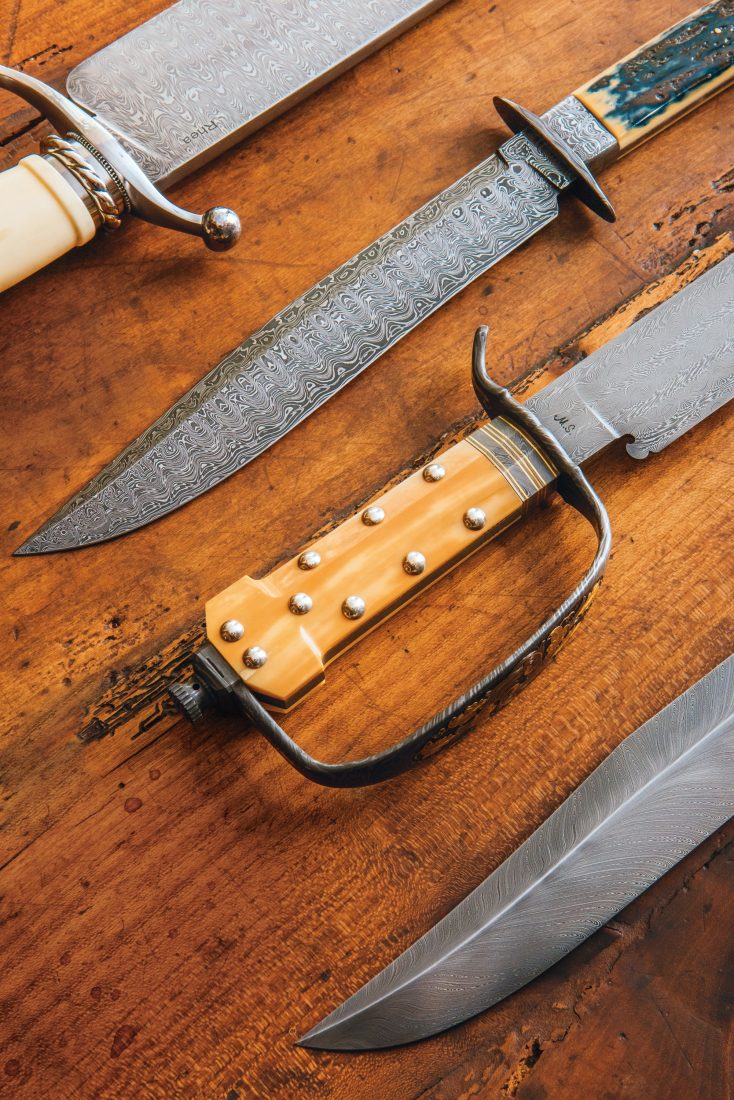The blades are forged of twenty thousand layers of steel, the handles wrought of walrus ivory, stag horn, or mammoth fossil. They gleam with 24-karat-gold acanthus leaves and fleurs-de-lis engraved in silver. In fact, the knives in Preston Gough’s private collection make up one of the finest assemblages of custom knives in the South. Just don’t ask Gough to pick a favorite.
 “Every one is dear to me,” the Jackson, Mississippi, insurance executive says. And not one is for sale, or ever will be. “I’m not in this to make money,” Gough asserts. “I’m just struck by how much work and knowledge these knives reflect, and I’d just as soon have a ten-thousand-dollar knife in my hand as look at a ten-thousand-dollar piece of art on the wall.”
“Every one is dear to me,” the Jackson, Mississippi, insurance executive says. And not one is for sale, or ever will be. “I’m not in this to make money,” Gough asserts. “I’m just struck by how much work and knowledge these knives reflect, and I’d just as soon have a ten-thousand-dollar knife in my hand as look at a ten-thousand-dollar piece of art on the wall.”
Gough is in the right place, as the South is known for its wealth of fine bladesmiths. In Arkansas, custom knife maker Jerry Fisk is an adviser to the Historic Arkansas Museum and has lectured and taught in Paris, Brazil, and Russia. Texas resident Tommy Gann is known for clean designs with exacting fit. Charles Vestal, of the Virginia Blue Ridge, crafts coveted knives in the famed Loveless style.
Gough collects them all, only the latest—and most ambitious—manifestation of a true curatorial mind-set. He developed a collector’s passion as a child, gathering stamps, steel pennies, and Mercury dimes. He spent paper-route money on baseball cards, amassing more than three thousand. A friend once said of Gough: “If pasture patties came with numbers, Preston would collect those, too.”
After undergraduate study and law school at Mississippi College, Gough turned to Montblanc pens, then Mississippi duck stamp prints. In the early 1980s, he commissioned a few knives from Tennessee bladesmith Wayne Clay, but it wasn’t until the 1990s, when his wife gave him a knife by fellow Mississippian Terry Vandeventer, that a spark for knife collecting kindled. Vandeventer introduced him to a coterie of top-level knife makers who might spend hundreds of hours on a single knife, and whose blades run from $2,000 to more than $10,000. “That did it for me,” Gough explains. “I fell into this amazing community of artisans whose work rivaled anything I’d ever seen.”

His collection now numbers more than a hundred custom knives, nearly all from the South. Gough houses the knives—with a collection of firearms and a five-thousand-bottle wine room—in a custom-built compound complete with a full kitchen, a massive fireplace, a half bath, and a steel door that leads to a breathtaking sight: guns and knives arrayed under glass and in velvet-lined drawers, set in with what seem to be acres of gleaming marble and Australian jarrah wood cabinetry. “It’s a fun place to ride out a thunderstorm,” Gough says, laughing, as if realizing his man cave got a little out of hand.
But the setting seems a fitting environment, since steel serves as a knife maker’s canvas. Consider one of Gough’s finest knives, and a personal favorite: John White’s Legacy bowie #3. The ornate bowie was to be a part of a five-knife series by one of the South’s most famous knife makers, but White, a Texas native, passed away in 2014 after completing only four of the set. It’s a rakish knife that grabs the eye and won’t let go, and not just because of its imposing 10¼-inch size. The handle scales are the color of amber, their earthy tones a foil to the patterned Damascus steel blade, while the blade bears deep-relief carving and 24-karat-gold inlays by engraver Joe Mason.

Over the last few years, Gough has purchased the other three Legacy knives to complete the series. “I do have a thing for the big bowie knives,” he says, laughing, but his connection to the seminal blade of Southern cutlery has less to do with the size of the fighting knives than with the heritage and myth of their namesake. During a bloody 1827 melee on a Mississippi sandbar outside Natchez, James Bowie was clubbed, shot, and slashed but still managed to kill his opponent. Newspaper accounts of the “Sandbar Fight” made Bowie a household name and kicked off a sensation for the knives that has never abated. “I love the mystery of that story,” Gough says, “and I think it’s really neat that it happened in my home state. Bowie knives are the apex of the art form, like a Colt revolver, and between the craftsmanship and the lore of the knife itself, it’s pretty hard for me to say no to some of these top-level bowies.”
These days, Gough splits his time between Mississippi and the Florida Panhandle, and his mind is never far from steel and bone. He serves on the board of the Custom Knife Collectors Association and is a fixture at important gatherings for bladesmiths. And it’s no surprise that he always keeps a few commissions under way.

What Gough likes most is to set a knife maker’s imagination free. When he comes across one whose work strikes a chord, he picks up the phone. “I ask: Is there a knife that you’ve always wanted to make—a style or size or approach that you’ve dreamed of, but that no one has ever asked you to try? They always say yes. And that’s where we start.”








